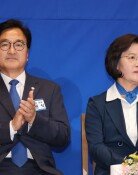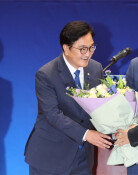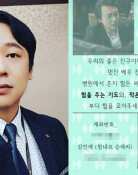[Editorial] Time to Focus on People`s Livelihoods
[Editorial] Time to Focus on People`s Livelihoods
Posted June. 24, 2008 18:07,
In an additional negotiation over U.S. beef imports, the government has successfully obtained a guarantee from the United States to prevent beef from cattle older than 30 months from being exported through the quality system assessment (QSA). Import restrictions will be put on four additional beef products, including brain and spinal cords, carrying risks of containing specified risk materials (SRM). The Korean government also secured the right to inspect U.S. slaughterhouses. This practically meets the demands of the public worried about food security. Even if the government performs a renegotiation, it will be hard to gain more than that. However, some organizations, protestors and the opposition parties continue to demand a renegotiation, which will shake the national plans for trade. This is a political offensive.
Yesterday, the government and the ruling Grand National Party decided to slightly delay the import of U.S. beef to dispel public uneasiness. When the sales of U.S. beef stored in the country begin after the promulgation of new sanitary guidelines for U.S. beef imports, the country will see how consumers respond to the mad cow controversy. Given that Korean beef is one of the most expensive beef products in the world, it is in the customers interest to lay out U.S. beef with Korean and Australian beef to give them a choice.
This year, in the Seoul Metropolitan area alone, 30,000 kilograms of imported beef, including Australian beef, was sold in the disguise of Korean beef. As beef is being sold at 330,000 establishments nationwide, including restaurants and retailers, it is not easy to monitor the sales. However, the public demands that the government prevent the false country-of-origin labeling. The government should ensure the correct country-of-origin labeling for beef, as it has promised. Korean beef farms and industry should make the most of the government support, including cash incentives, and improve the entire process of beef production, including raising, slaughtering and distribution of cattle, so as to attract consumers.
Despite the positive results from the additional negotiation, overnight demonstrations took place over the weekend. Protestors tied ropes to a police bus to break the barricade and even attempted to set fire on a bus. The arsonist was caught by protestors and handed over to the police, but there is no guarantee that there will be no serious and unfortunate incident in the future, if the People`s Association for Measures Against Mad Cow Disease keeps inciting protestors. The association, which leads candlelight vigils and protests, should understand public rage that it is effectively inciting illegal actions and violence, and stop its excessive struggle against the government.
Protestors piled sand bags that the Seoul City government was keeping to use for construction work, and used them as steps to walk over to police buses. The sand also belongs to the public. As the protestors used loud speakers through the night at the city center, citizens living nearby cannot sleep well and are feeling anxious. Residents around Gwanghwamun and the City Hall cannot freely walk around their neighborhood, while restaurants and stores nearby suffer sales decline. Protestors argue that they are exercising the right of free expression to protect the right to protect public health. But no one has the right to hold illegal demonstrations while compromising others rights.
The government should generate a social atmosphere in which corporations and the private sector can do their business freely without feeling uneasy. However, the government gave up its role of safeguarding law and order by turning a blind eye to illegal protests. A government that neglects the violation of peoples valuable rights cannot be called a government. Society as a whole should also sternly respond to forces that incite illegal actions and violence or lead illegal protests.
At times like this, the role of political circles is even more important. However, United Democratic Party lawmaker Kim Jong-yull said, The quality assurance system is the Trojan horse full of poison, arguing that the only solution is a full renegotiation. The Liberty Forward Party also argued, That means that the government will leave public health to the indirect regulation of the United States. Setting aside the inexperienced Democratic Labor Party, the attitudes of the UDP and LFP are a shining example of irresponsibility.
The UDP is a combination of the older Democratic Party, which was the ruling party during the reign of former President Kim Dae-jung, and the Uri Party, which was the ruling party under the Roh Moo-hyun administration. The UDP has a combined 10-year experience in managing state affairs and produced numerous prime ministers, ministers and vice ministers. The LFP is also led by former Prime Minster Lee Hoi-chang and Sim Dae-pyung who managed overall state affairs in the prime ministers office.
The two parties are well aware that the additional negotiation must be the last negotiation. Still, they demand the government nullify the negotiation and start renegotiating. That means that they do not care if the state affairs are paralyzed, the economy and the peoples livelihoods are in jeopardy, and whether the country gives up advancement in the globalized world. It is a totally irresponsible attitude.
The UDP is reportedly planning to convene a meeting to reach a consensus on attending the 18th National Assembly. Hopefully, the meeting would not become an opportunity for hardliners to incite anti-Americanism. If it is a responsible political party as stated in the constitution, the party should think of how to work for the people and cooperate with the ruling party.
Amid worsening inflation, ordinary people of the country are having difficulties making ends meet. The self-employed express their frustration, saying, The life is harder than it was during the 1997 financial crisis. Internal and external negative factors are threatening the economy and the peoples livelihoods, including inflation, sluggish domestic consumption, soaring oil prices and economic slowdown in advanced economies. The public and private sectors are both concerned about a potential economic crisis.
The government is primarily responsible for this situation, since it failed to predict change in domestic and international economic environments and effectively manage the economy. Following the reshuffling, it should offer plans for overcoming the current economic difficulty and implement them to win back trust from economic players. It should break away from the growth or stability argument, which caused policy confusion, and come up with and implement practical measures to improve the peoples livelihoods. It should expedite strengthening of economic fundamentals through deregulation and investment promotion, while focusing on offering measures to absorb shocks from high oil prices.
As the main player of production, investment and employment, corporations, for their part, should lead economic revitalization by showing their entrepreneurship. The Korean economy has learned from its experience of surviving numerous crises that the overall economy can be invigorated only when corporations start investing.
The role of individual Koreans is also important. Whether they are salaried workers or self-employed, their economic activities have impact on one another. The Korean people need to think of what kind of impact their excessive cutting of spending can have on themselves, their neighbors and the entire community. When times are hard, people need to be wise so that they can survive and thrive together by sharing burden and suffering. They cannot let the countrys hard-earned economic success fade away.







